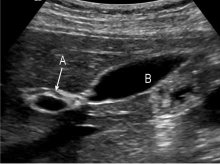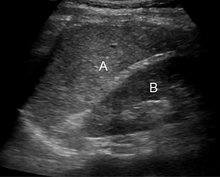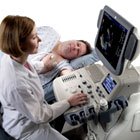Abdominal ultrasound is an imaging procedure used to examine the internal organs of the abdomen including the liver, gallbladder, spleen, pancreas, and kidneys. The blood vessels to some of these organs can also be evaluated with the use of ultrasound techniques.
The ultrasound machine sends out high-frequency sound waves that reflect off body structures to create a picture. Unlike with x-rays, there is no ionizing radiation exposure with this test.
Alternative NamesUltrasound - abdomen; Abdominal sonogram
Why the Test is Performed
There are many reasons for performing an abdominal ultrasound, including looking for the following:
A cause of abdominal pain
Stones in the gallbladder or kidney
A cause for enlargement of an abdominal organ
The reason for the examination will depend on your symptoms.
How the Test is Performed
The test is done in the ultrasound or radiology department. You will be lying down for the procedure. A clear, water-based conducting gel is applied to the skin over the area being examined to help with the transmission of the sound waves. The ultrasound transducer (a handheld probe) is then moved over the abdomen.
You may be asked to move to other positions so the health care provider can examine different areas. You may also be asked to hold your breath for short periods of time during the examination.
The procedure usually takes less than 30 minutes.
How to Prepare for the Test
Preparation for the procedure depends on the nature of the problem and your age. Usually patients are asked to not eat or drink for several hours before the examination. Your health care provider will advise you about specific preparation.
How the Test Will Feel
There is little discomfort. The conducting gel may feel slightly cold and wet.
Risks
There is no documented risk. No ionizing radiation exposure is involved.
Normal Results
The organs examined are normal in appearance.
What Abnormal Results Mean
The significance of abnormal results depends on the organ being examined and the nature of the problem. You should consult your health care provider with any questions and concerns.
Many possible conditions could be revealed by an abdominal ultrasound. Some of these include:
Gallstones
Kidney stones
Cholecystitis
Hydronephrosis
Splenomegaly
Pancreatitis
http://www.drugs.com/enc/abdominal-ultrasound.html
Subscribe to:
Post Comments (Atom)









3 comments:
You do a great job! your information is clear, and presented well. Thank you for an informative piece!
yes, I echo Chris' comments - good job Jen - very informative.
Catherine
Hi Jen,
Your research and descriptions of various aspects of ultrasound technology are very informative and interesting. Thank you for the references as well, since I may refer to this in the future. The fetal ultrasound looks like he/she is break dancing. This was an amazing photo. I have ultra sound photos of my children taken over 20 years ago and of my grandson born only 8 months ago. I can really appreciate today's images which are so much more clear and detailed than in previous years. I have always had an interest in learning about other professions in the health field. Thank you for sharing. Mary Anne
Post a Comment